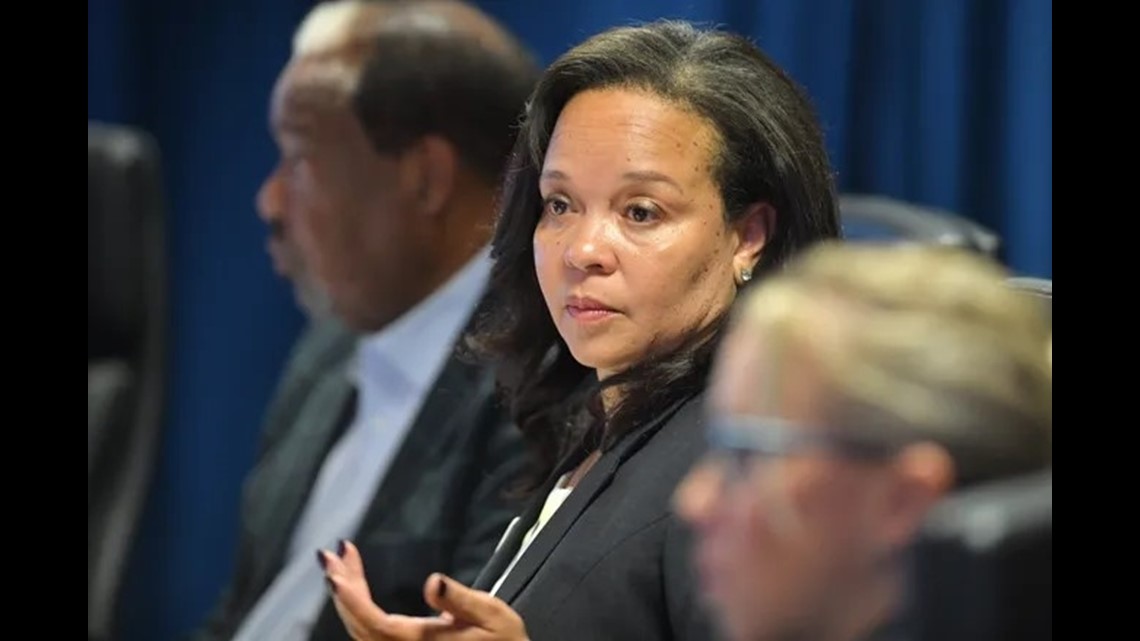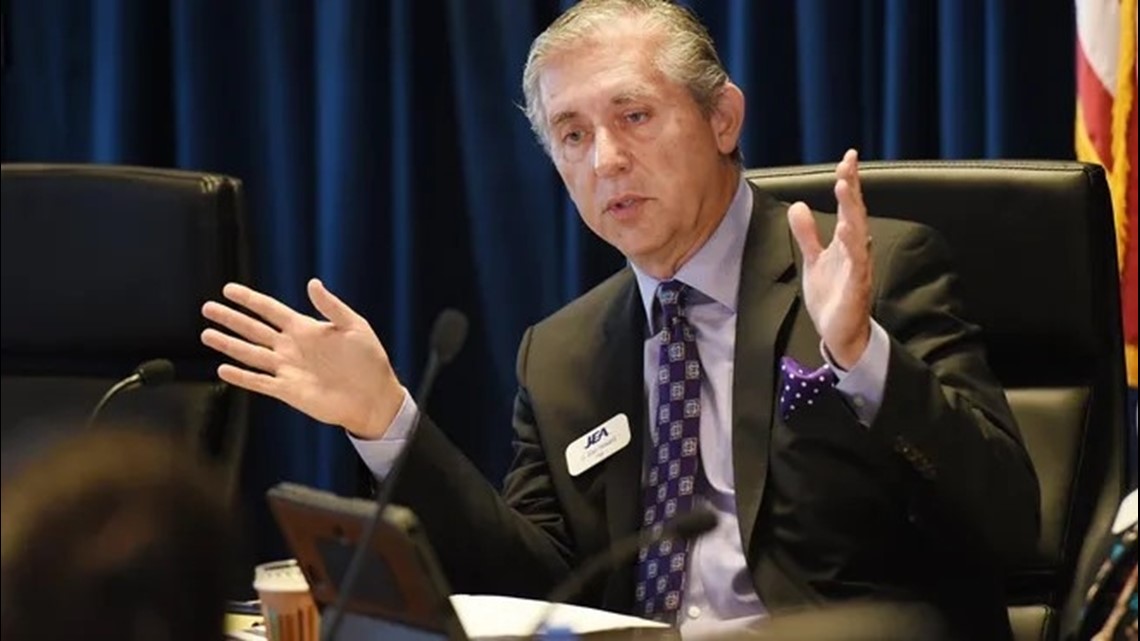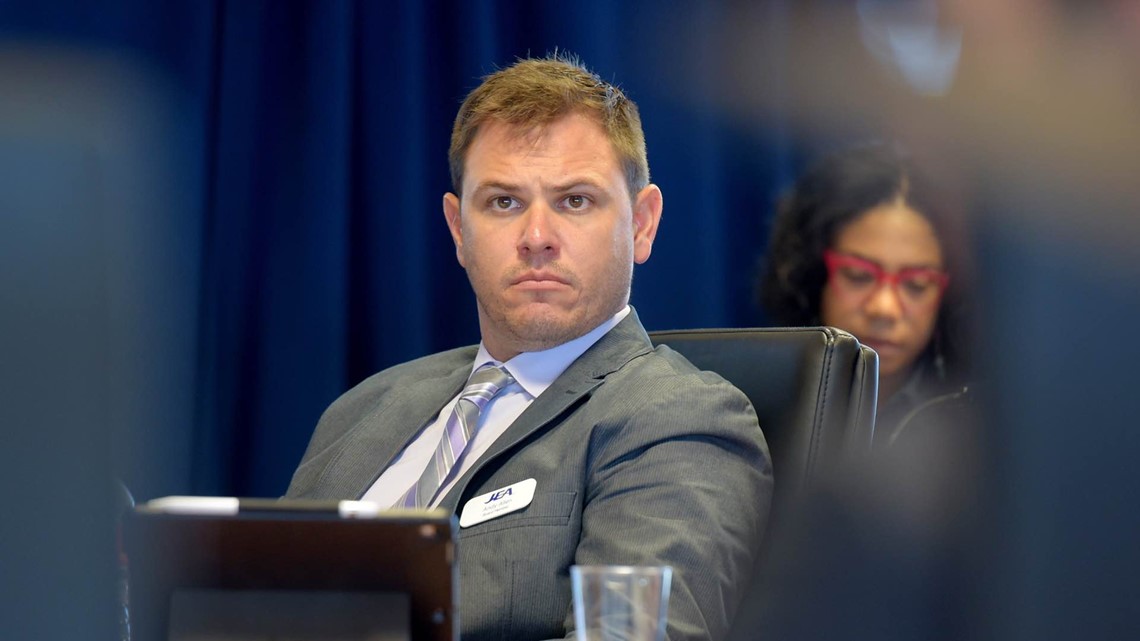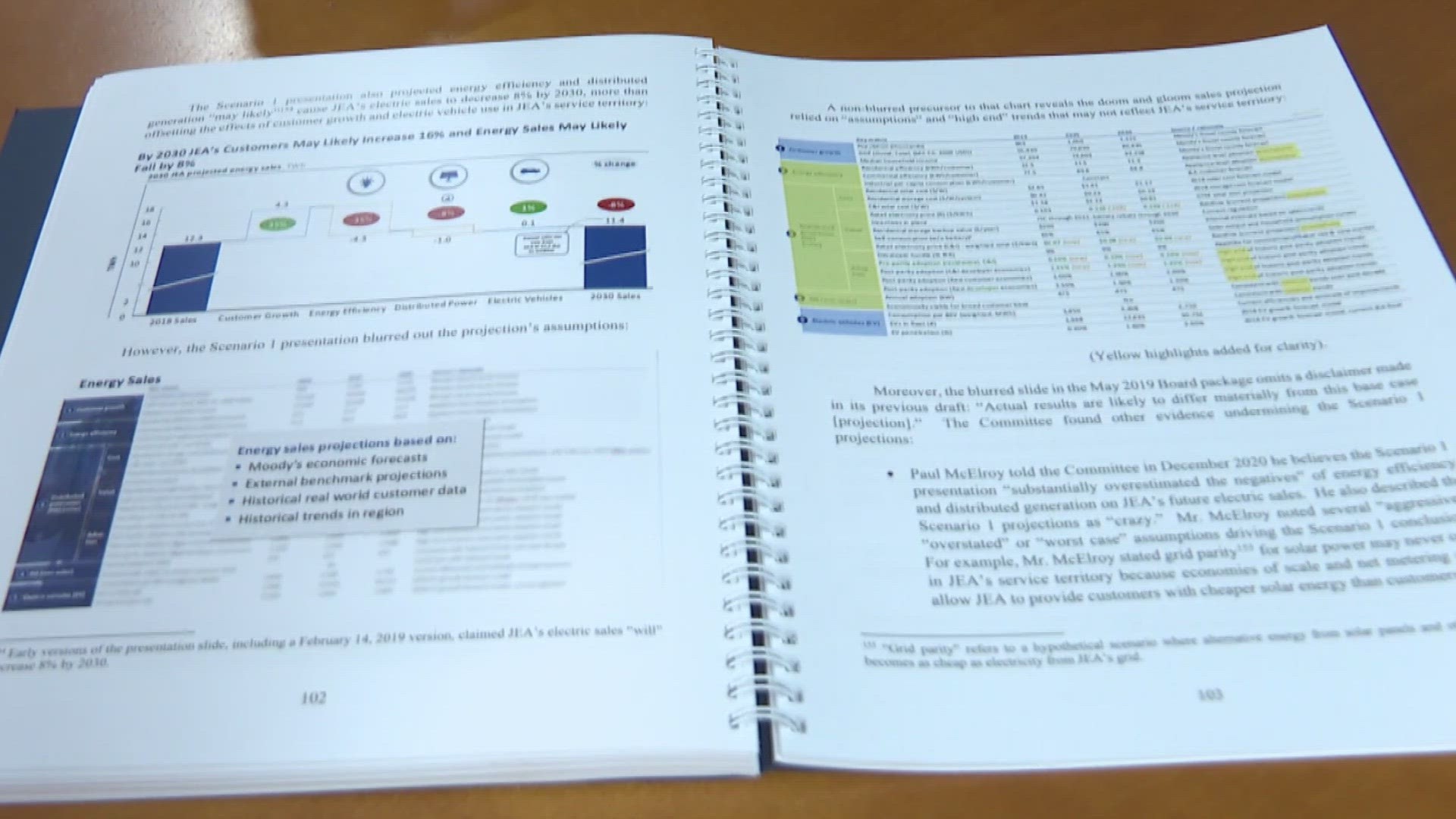JACKSONVILLE, Fla. — The trial of former JEA executives Aaron Zahn and Ryan Wannemacher continued Wednesday. The two are accused of deceiving the JEA board and conspiring to sell the utility, skimming hundreds of millions off the top.
At the time of the alleged conspiracy, Zahn and the board had decided – for reasons debated throughout the trial – that a decision must be made to ensure the future of JEA.
One thing both sides agree on: JEA elected to pursue a radical change.
In July 2019, the board vote to approve a "performance unit plan," proposed by Zahn and Wannemacher, a program that could have landed them with a huge windfall if the utility were to sell. Board members testified Tuesday and Wednesday that they had no idea the enormity of potential bonuses the executives could earn; no one told them.
Five of the six who voted have testified they would not have voted for the plan if they had all the information.
Wednesday's testimony also saw the first evidence of Zahn's narrow focus on selling JEA and potentially creating a huge influx of cash to the utility.
Testimony starts to unveil Zahn's dedication to sale
The vote also gave Zahn license to explore options to privatize the utility.
In passing, board member Allen Howard testified NextEra, the parent company of Florida Power & Light, was willing to bid $11.05 billion to get JEA.
Throughout the trial, Zahn and Wannemacher’s attorneys have sought to deny that they were set on a sale. Privatizing and selling JEA was crucial to the payout at the center of the case: No intention to sell, no intention to deceive and cash out.
To this end, testimony from consultants and board members that they did not know about a sale, other than as an option among many, could work in the defense's favor. But the prosecution argues that Zahn and Wannemacher always intended to sell – they just kept it between them, potential buyers and a few other key players.
When questioning former-board member Kelly Flanagan, Wannemacher’s attorney Jim Felman asked her if there was an “array” of choices for this plan. She testified that there were several options, and a sale had not been chosen. Others have testified that there were other options presented, such as turning JEA to a co-op or exploring ownership.
There were other options -- but the JEA executives were putting far-and-away the most energy into a sale. Proof of the executives pouring resources into the sale, including off-site meetings with buyers that predated any on-record talk of the sale, had largely not been presented to the jury yet, until former-JEA Board Chair April Green took the stand Wednesday afternoon.
Green was the first to -- briefly -- mention an off-site meeting where Zahn traveled to meet bidders in Atlanta. She said she urged him to halt sale efforts and to cancel. Zahn, she said, remained steadfast and told her the meeting "could not be canceled."
Another prolific off-site meeting at the Club Continental Orange Park was mentioned during former-board member Alan Howard's testimony, but Howard said he attended little of the meeting.
Five of six board members now say they don't support plan
Prosecutors continued to chip away a cornerstone of Zahn and Wannemacher’s defense Thursday.
Since they were accused, Zahn and Wannemacher have maintained that the performance unit plan was approved by the JEA Board of Directors. And it was, unanimously, at a July 23, 2019 meeting much of the case surrounds.
While the defense explained to the jury the qualifications of each board member, stressing that this group of people would have noticed red flags, testimony shows that the board members approval has evaporated.
As of Thursday afternoon, five of the six board was members who voted to approve the plan — Rev. Fred Newbill, Kelly Flanagan, Andy Allen, Howard and Green — have testified that if they knew there was such a large payout at stake, they would never have approved it. Only board member Camille Lee-Johnson has not testified yet.
When asked why he wouldn’t go for it, Allen said, “Because that’s ridiculous.” Howard called the compensation “excessive"; Green, who has been a vocal critic of Zahn, said she "absolutely" would not vote the same today.
The defense has repeatedly argued that the board members have a litany of qualifications and would have seen any red flags in the plan.
In turn, the prosecution says that the board members — as well as others who signed off on the plan, including Jacksonville’s Office of General Counsel — didn’t know what they were looking at.
Witnesses: Not so 'easy math'
Jim Felman, Wannemacher’s attorney, has repeatedly stressed that the formula for the performance unit plan is simple, easy math. While his client was the one running the numbers, he says the average person could have done the math themselves, even quizzing board members on math problems to prove his point.
However, testimony so far has mostly backed up the prosecution’s story: Multiple witnesses, including former members of the JEA Board of Directors, said they did not fully understand the math behind the plan.
No one, except the city auditors who ultimately decoded the formula, has testified that they could have figured out the size of the bonuses on their own.
The packet distributed to the board, notably handed out in a hard copy rather than uploaded online as usual, was over 100 pages, with the layout of the performance unit plan at the end.
Flanagan testified that the packet followed the typical order and she did not believe the plan was buried intentionally. Nonetheless, Allen testified that by the time he flipped to that part of the packet, he was “exhausted.”
Speaking about the plan, Allen said, “It was very difficult to understand that documentation.”
Howard said the packet was delivered to him on either Sunday or Monday — the July 23 meeting was on Tuesday, and he characterized it as “last minute,” though he assumed the late delivery was due to the effort poured into the report.
With admittedly little time to prepare, he says he “tried” to go over the packet, and didn’t refute video testimony that he’d read it multiple times. But, he said, “It’s voluminous, and dense… Even for a lawyer.”
When asked, he said he did not have “any idea” the performance unit plan could generate hundreds of millions of dollars in a bonus pool.
If they had, testimony suggests the vote would have turned out differently.
On the stand, Allen was asked about a complimentary performance review of Zahn he filled out shortly before he resigned from the board for personal reasons. Though he cautioned that he hadn’t paid much attention to the review, with “one foot out the door,” he testified that if asked today: “I would have definitely rated differently.”









